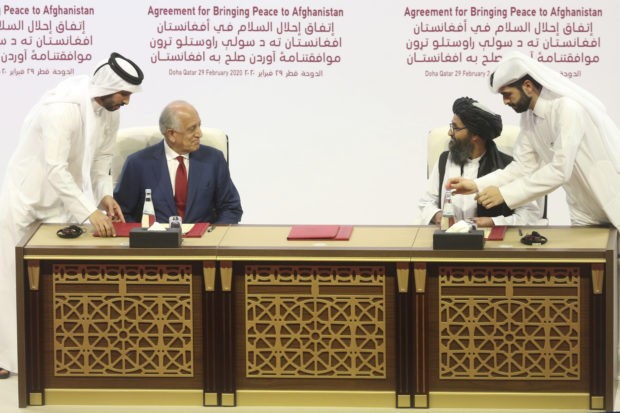Warring Afghans meet to find peace after decades of war

FILE – In this Feb. 29, 2020, file photo, U.S. peace envoy Zalmay Khalilzad, left, and Mullah Abdul Ghani Baradar, the Taliban group’s top political leader sign a peace agreement between Taliban and U.S. officials in Doha, Qatar. The Taliban say the long-awaited peace talks with the negotiating team selected by the Afghan government are to begin on Saturday, Sept. 12, 2020, in the Gulf Arab state of Qatar. The announcement on Sept. 10, came in a statement from the Taliban in Qatar, where the insurgents maintain a political office, and also as an announcement from Qatar’s foreign ministry. (AP Photo/Hussein Sayed, File)
DUBAI, United Arab Emirates — After decades of conflict, Afghanistan’s warring sides will open long anticipated negotiations Saturday in search of a lasting peace that will also provide an exit for U.S. and NATO troops after nearly 19 years.
The mostly ceremonial opening in the Gulf state of Qatar, where Afghanistan’s Taliban insurgents maintain a political office, is the latest in a flurry of diplomatic activity by the Trump administration ahead of the U.S. presidential election in November.
Saturday’s launch of intra-Afghan talks, attended by U.S. Secretary of State Mike Pompeo, follows the U.S.-brokered recognition of Israel by two Gulf nations — Bahrain on Friday and the United Arab Emirates earlier this month.
The talks in Doha bring together negotiators appointed by the Afghan government and the Taliban’s 21-member delegation.
After a ceremonial opening, the sides will try to tackle tough issues.
Article continues after this advertisementThis includes the terms of a permanent cease-fire, the rights of women and minorities and the disarming of tens of thousands of Taliban fighters and militias loyal to warlords, some of them aligned with the government.
Article continues after this advertisementThe sides are also expected to discuss constitutional changes, and power sharing.
Even seemingly mundane issues like the flag and the name of the country __ the Islamic Republic of Afghanistan or as the Taliban’s administration had been known, when it ruled, the Islamic Emirate of Afghanistan __ could find their way on to the negotiation table and roil tempers.
Among the government-appointed negotiators are four women, who vow to preserve women’s rights in any power-sharing deal with the fundamentalist Taliban.
This includes the right to work, education and participation in political life __ all denied women when the Taliban ruled Afghanistan for five years. The Taliban were ousted in 2001 by a U.S.-led coalition for harboring Osama bin Laden, the architect of the Sept. 11 terrorist attacks on America.
There are no women on the Taliban’s negotiation team, led by their chief justice Abdul Hakim.
Pompeo has said he expected the discussions to be contentious.
Washington’s peace envoy for Afghanistan Zalmay Khalilzad said Friday that launching the talks is an important achievement, but that “there are difficulties, significant challenges on the way to reaching agreement.”
“This is a test for both sides, for the Taliban and the government,” he said. “Can they reach an agreement despite differences, in terms of their visions for the future of Afghanistan? ”
The intra-Afghan negotiations were laid out in a peace deal Washington signed with the Taliban on Feb. 29. At that time the deal was touted as Afghanistan’s best chance at peace in 40 years of war.
The talks were originally expected to begin within weeks of the Feb. 29 signing.
But delays disrupted the timeline from the outset. The Afghan government balked at releasing 5,000 Taliban prisoners, which was stipulated in the deal as a sign of good faith ahead of the negotiations.
The Taliban were required to release 1,000 government and military personnel in their custody.
Political turmoil in Kabul further delayed talks as Afghan President Ashraf Ghani and his rival in controversial presidential polls the year before, Abdullah Abdullah, squabbled over who won, with both declaring victory.
Abdullah was named to head the High Council for National Reconciliation overseeing the peace talks as part of a power-sharing agreement to end the bickering.
The Taliban’s refusal to reduce the violence further hindered the start of talks.
While Washington ramped up pressure to get the intra-Afghan negotiations started, the deal they signed with the Taliban to withdraw completely from Afghanistan does not hinge on the success of the talks.
Washington’s withdrawal is contingent on the Taliban honoring commitments to fight terrorist groups, in particular the Islamic State affiliate in Afghanistan, and ensure that Afghanistan cannot again be used to attack America or its allies.
Washington has refused to give specific of the guarantees citing security reasons, but the withdrawal of U.S. troops has already begun. President Donald Trump has said that by November, about 4,000 soldiers will be in Afghanistan, down from 13,000 when the deal was signed in February.
“Washington’s goals are very simple: It wants intra-Afghan talks happening as soon as possible, because these give the White House political cover for an imminent withdrawal,” said Michael Kugelman, deputy director of the Washington-based Wilson Center’s Asia program.
“Trump likely wants a peace deal before the election, so that he can garner political benefits galore and pitch himself as a Nobel Peace Prize candidate.
But presumably even he realizes it’s wildly unrealistic to expect a deal so soon. These types of negotiations tend to be measured in years, not weeks.”